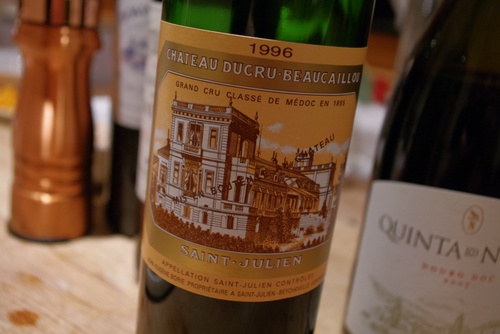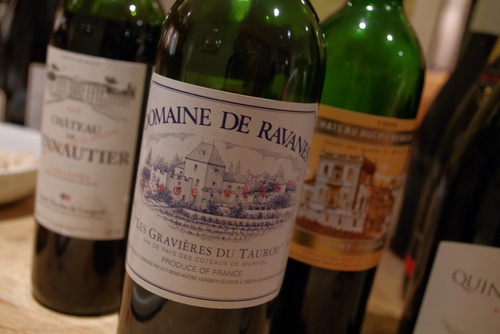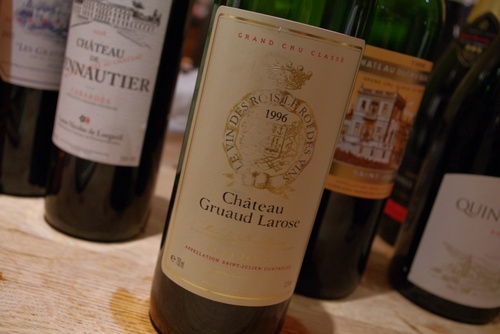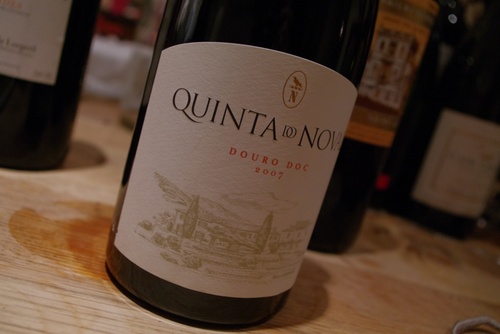A spot of blind tasting Blind tasting is fun. It isn’t the only way to taste, and I don’t think it’s necessarily all that useful to assess fine wines blind – largely because there is more to a wine that what is just in the glass.
But when you taste blind, you learn. You learn about the wine, and you learn about your own palate. Best of all, it humbles you. Most of us need humbling on a regular basis. Last night, after quite a bit of Champagne consumption, brother-in-law Beavington tested me with five blind wines.
I was rubbish. Properly humbled. But I learned something. In the spirit of open disclosure I’m going to share my impressions.
Please don’t laugh. Sometimes I can be quite good at this, I promise.
Wine 1
Spice, chalk, cedar, earth. Bordeaux with some age? Mature plummy fruit with nice tannic grip. Blackcurrant notes with a grippy, savoury edge. Ripe but with some age. Quite rich and ripe: a warm Bordeaux year? 1990 or 1996? Complex and mature. 92/100
The wine: Domaine de Ravanes Les Gravières du Taurou Grande Reserve 2000 Vin de Pays des Coteaux des Murviel, Languedoc, France
This wasn’t a terrible guess, because it’s a very Bordeaux-like Languedoc wine. Last time I tasted it blind in 2004, in a flight of 3 including Petrus, I guessed this as the Petrus.
Wine 2
Sweet, ripe, green herby edge to the nose which shows sweet blackcurrant fruit. Leafy and floral. The palate shows fresh blackcurrant fruit that’s green yet ripe and sweet at the same time. It makes me think of Loire Cabernet Franc, but it’s quite sweet so could also be from a warmer climate. Languedoc Cabernet Sauvignon, 2008 vintage?
The wine: Chateau de Pennautier 2008 Cabardès, Languedoc, France
This was a pretty good guess, although I should have had the courage to ditch the Loire and head south straight away.

Wine 3
Ripe and aromatic, with herbs and spice as well as some exotic berry fruit and a bit of earth. Lovely chalk and gravel edge to the palate. Showing some maturity, but very rich and ripe with sweetness to the fruit. Ripe Syrah? 1995 Rhone? 93/100
The wine: Château Ducru Beaucaillou 1996 Saint Julien, Bordeaux
This was a bad guess. Vintage was close, but region was wrong. Does terroir become diminished with age? A classy wine, none-the-less.
Wine 4
Very rich, warm, ripe aromatics, with tar, spice and warm fruity notes. The palate is rich, mature, cedary and quite elegant, with some chalk and spice. Complex and really elegant, showing good concentration. This is a lovely Bordeaux, that’s mature, ripe and sophisticated. 1995 right bank. 94/100
The wine: Château Gruaud Larose 1996 Saint Julien, Bordeaux
A good enough guess, but not quite right. It was left-bank 1996. A lovely wine.
Wine 5
Sweet, ripe, pure and lush. Good definition to the pure, elegant ripe blackberry and black cherry fruit. Lovely purity here. Ripe but fresh. This is a modern high-end Languedoc style red. 2010 vintage? 89/100
The wine: Quinta do Noval 2007 Douro, Portugal
This was the most striking error of the night. Tasted sighted, I have rated this wine very highly indeed. On tonight’s showing, it was very appealing, but showing little more than pure, sweet fruit. This was simpler and less compelling that I’ve found it on previous tastings. I have a bottle: I’ll be keeping it 5 years more at least to hope that it develops some complexity. Was I wrong in rating it so highly on previous occasions? I hope not.






The fact that you publish these “wrong notes” definitely prove your humility! I put the commas because it isn’t this bad! Actually, I was hoping for more fun, haha!
Well Jamie, you gave it a good shot!
Looking forward to the bubbly tasting.
Bob Alberta
Do not think your guesses were any worse then anyone else,s would have been. With the exception of a couple of people ,I have found that experienced professionals are no better at blind tasting than the average oenophile. But like you,I love it and think it brilliant for palate calibration
After one of my last tastings I described my self-esteem as “a little ball of misery lying bloodied in a corner and weeping”. It is and remains bloody difficult, and smetimes you’re good, sometimes horribly wrong. But it remains indeed fun, and very interesting fun !
Don’t beat yourself up, these were pretty good guesses. The only real slip up was the Douro red, stylistically. Qualitatively,it did come after a couple of world renowned wines, so there’s no surprise it came down a peg.
I wonder if the more obvious reason for the disparity on the Quinta de Noval is the variable – sighted/unsighted – and not the wine?
So on previous occasions you scored it differently because, in some way, seeing the label altered your perception.
I agree that blind tasting is not the best way to enjoy a wine, although it slightly worries me that it should be like that. When you say that there’s more to wine than what’s in the glass, that seems wrong, yet I agree. There’s a worry in my mind that there’s something “unreal” about the psychological aspects of a wine’s performance, but maybe that’s unreasonable. Maybe we just need a fuzzy french word for it – like psyoir or suchlike? 😉
Hello Jamie, terrific blog you have. You gave qualified support to blind tasting, as a very enthusiastic wine hobbyist, I find it somewhat hard to understand how evaluating a wine can be done with absolute integrity any other way except blind tasting. Does knowing who made it help you predicts its future, adjusting your scores accordingly? any way great site, enjoy reading everything you post.
I din’t particularly enjoy blind tasing either. Two main factors being I put far too much pressure on myself and secondly rather than judge the wine strictly on it’s merits I end up having eons of questions that I never experience when normally righting up notes. Surprised you got the Ducru so wrong and that Noval error will haunt you well into the new year.
A group of 7 have regular – bi-monthly – blind wine tastings. We’ve done Rieslings, Rose, Chardonnay, Cru Beaujolais, Sauvignons and everyone has to bring a bottle chosen from some local stockist. We have all price ranges in each category and, yes, it can be humbling. We individually describe and rate the wines and have a big reveal at the end with much smacking of foreheads and laughter – usually from the person least experienced at the most experienced. Next up is Shiraz to which I formally invite you (with bottle, of course). Venue Sutton Coldfield. Oh, and there’s good quality food at the finish. Check out the blog http://ricmorris@wordpress.com7
Full marks for owning up, Jamie. If it’s any consolation my guesses would probably have been equally random – never been much of a one for blind tasting. What I find fascinating though is that your brother-in-law would want to put you through the hoops on what’s supposed to be a relaxed family occasion. Why? To demonstrate his superiority over a professional wine writer? Odd.
Interesting too that all the people who have commented on this post so far – and seemingly enjoyed similar experiences – are men. Challenges like these seem to be a particularly male pastime. I don’t find women, even in the trade, go in for them much. They tend to bring a wine along, tell the story behind it, exchange their impressions, chat about other stuff – or just pour. It’s much less competitive.
Yes, well Fiona, there’s nothing to be gained (and everything to be lost) from partaking in this kind of game/challenge, so it’s hardly surprising that people in the trade should try to avoid it. The same might also apply to women in general, who are generally far more sensible to waste their time and energy on such pursuits…
I think that Jamie and Beavington do this every Christmas, and so it’s a fun tradition and parlour game rather than an attempt to show off or prove anything.
It wasn’t competitive. It was actually tremendous, mildly drunken fun. I always enjoy doing it – and I think it leads to more honesty around wine, which is a good thing. It teaches us to be humble in the face of wine. I am not insecure about my tasting abilities, so I don’t mind putting them to the test. Identification is one thing, and I’m happy to make reasoned judgments even if I don’t get anywhere close to the actual identity of the wines, as long as I have made logical steps in describing it.
These are not terrible guesses. Nailing the wine is fun when it happens but hardly the point. You did very well after bubbles and yes, the terroir typicity declines with age. The best reds seem to move to a very similar place at full maturity.
Just a last thought – do you think that blind tasting improves your tasting notes for “sighted” tastings? Hadn’t really thought about this before, but it strikes me as plausible that it might.
How lucky are you to have access to such a variety of fine wines. I’m new to this and admire your palate and your ability to express what you are tasting. Finding the words is sometimes dificult
Lots of fun, great post. I love doing blind tastings…my favourite being when I have my sister-in-law, a non-drinker, decant the mystery wines into identical carafes, so there isn’t even any bottle-shape influence. Then the whole group fails miserably and we can all laugh at each other.